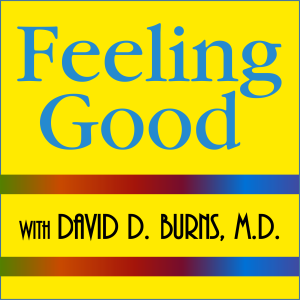
Feeling Good Podcast | TEAM-CBT - The New Mood Therapy
Health & Fitness:Mental Health

050: Live Session (Marilyn) — Agenda Setting (Part 2)
 2017-08-21
2017-08-21
The Hidden Side of Depression, Anxiety, Defectiveness, Hopelessness and Rage
We nearly always think about negative feelings, such as moderate or severe depression, as problems that an expert must try to fix, using drugs and / or psychotherapy. There are a multitude of theories about why humans become depressed, including, but not limited to:
We get depressed because reality sucks. We believe our mood slumps result from the circumstances in our lives, such as being alone following a rejection, experiencing the loss of a loved one, not having enough money, education or resources, social prejudice, or (as in Marilyn’s case) facing some catastrophic circumstance, such as severe illness. We get depressed because of insufficient love and nurturing in childhood, or because of traumatic childhood experiences. Biological factors. We get depressed because of our genes, or diet, or because of a chemical imbalance in our brains.Certainly, there can be some truth in all of these theories. Reality does kick us all in the stomach from time to time, and the pain we feel is understandable. My wife and I lost her father to Parkinson’s Disease a few years ago. We loved him tremendously, and his loss was extremely painful for everyone in our family.
And most of us have experienced less than ideal circumstances when growing up, and many have even been victimized by horrific and tragic circumstances, such as child abuse. And clearly, some severe psychiatric illnesses, such as schizophrenia, do result from some kind of brain abnormality.
But the problem with all of these theories is that they put us at the mercy of forces that are largely beyond our control—since we often cannot do much to change reality, rewrite our childhoods, or modify our brains short of taking this or that medication.
In this podcast, Matt and David take a radically different approach, and argue that Marilyn’s intense feelings of depression and anxiety are not “mental disorders” that reflect some defect in Marilyn, but rather the expression of what is most beautiful and awesome about her. They also argue that there are large numbers of advantages, or benefits, of feeling the way she does, using several Paradoxical Agenda Setting techniques such as the Miracle Cure Question, Magic Button, Positive Reframing, and Magic Dial. The results are stunning and unexpected. Or, as Marilyn put it, this portion of the session was “mind-blowing.”
The third and final podcast next week will include the M = Methods phase of the session along with the end-of-session T = Testing and wrap-up, including Relapse Prevention Training.
Marilyn DML with goal column
More Episodes
 2024-01-29
2024-01-29
 2024-01-15
2024-01-15
 2024-01-08
2024-01-08
 2024-01-04
2024-01-04
 2024-01-01
2024-01-01
 2023-12-25
2023-12-25
 2023-12-18
2023-12-18
 2023-12-04
2023-12-04
 2023-11-27
2023-11-27
 2023-11-20
2023-11-20
 2023-11-06
2023-11-06
 2023-10-30
2023-10-30
Create your
podcast in
minutes
- Full-featured podcast site
- Unlimited storage and bandwidth
- Comprehensive podcast stats
- Distribute to Apple Podcasts, Spotify, and more
- Make money with your podcast
It is Free
- Privacy Policy
- Cookie Policy
- Terms of Use
- Consent Preferences
- Copyright © 2015-2024 Podbean.com


